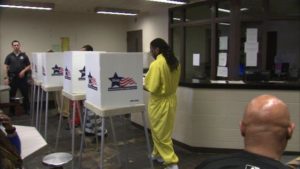
(ABC 7/Chicago)
Inmates vote at Cook County Jail
HARTFORD, Conn. (AP) — The NAACP sued Connecticut on Thursday over how the state counts its inmates when crafting legislative districts, arguing that urban districts are weakened while rural districts with fewer minorities unfairly benefit.
The civil rights organization hopes the case can become a template for lawsuits it may file in other states where inmates are included in the population counts of areas where they’re imprisoned rather than their home districts.
Including incarcerated people in population counts for the Connecticut General Assembly districts where prisons are located is unfair to those living in the districts where the inmates originally came from, said Derrick Johnson, NAACP President and CEO. This way of counting prisoners when drawing district lines, even though they can’t vote, is often referred to as prison gerrymandering.
“It gives disproportionate weight to oftentimes rural parts of the states, justifying disproportion in terms of representation and the allocation of state and federal funds,” Johnson said. “If you consider where individuals are from, you allow for a more accurate representation and allocation of public funds.”
The state attorney general’s office “will review the complaint and respond at the appropriate time in court,” spokeswoman Jaclyn Severance said.
The suit, filed in federal court and to be announced at a news conference in New Haven, is part of a larger effort by the NAACP to fight practices the civil rights organization argues are attempts to suppress minority voting. Those efforts include putting limits on same-day voter registration and failing to allow early voting, said Bradford Berry, the NAACP’s legal counsel.
Prison gerrymandering can affect the shape of power in state legislatures across the country. And it’s the urban legislative districts, with larger minority populations, that lose out because there is essentially an undercount in their communities, Berry said.
The lawsuit contends this practice dilutes the vote and therefore violates the Equal Protection Clause of the 14th Amendment of the U.S. Constitution.
Rich Medina, who’s in a Yale Law School group of students working with the NAACP on the case, said a vast majority of states apportion their legislative districts the same way as Connecticut. Only Maryland, Delaware, California and New York have enacted laws that require inmates be counted toward the populations of their home districts for legislative redistricting purposes.
The NAACP is taking legal action on this issue after several failed attempts to pass similar legislation in Connecticut. The most recent effort fizzled in 2016.
“Pretty much the only avenue that we must take now is through the courts,” said Scot X. Esdaile, chairman of the state NAACP chapter. “This is about power, and nobody gives away power. You’ve got to take power.”
In past years, Connecticut lawmakers with prisons in their district complained they could lose funding from state grants if population figures were compiled differently. Republican state Sen. John Kissel would be most affected by such a change. There are thousands of inmates in his district, which spans seven towns, farmland and six rural prisons near the Massachusetts border.
While Kissel has said he might support legislation that changes how inmates are counted, he has pointed out there are other communities affected by other transient populations, such as college students.
“What about all the kids at UConn? What about other areas of the state where people are counted in terms of voting districts but they may not necessarily be there year-round?” he asked in 2016.
When crafting district lines, states rely on figures from the U.S. Census Bureau, which counts people wherever they live or sleep most of the time. For an inmate, that’s behind bars.
The next census will be in 2020, and Medina said the NAACP wants redrawn legislative maps for Connecticut’s 2022 elections to account for the hometowns of inmates.


